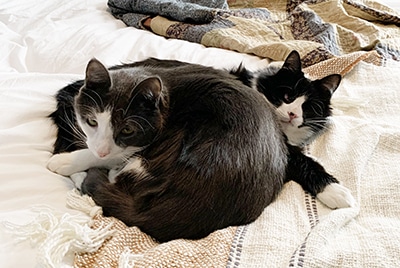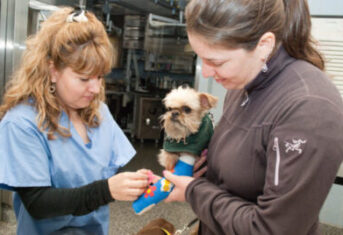Is It Safe to Sleep with My Pet?

Is It Safe to Sleep with My Pet?
Pets comfort us in many ways. I suspect many pet owners cherish a night cuddling with their favorite fur person after the day’s stresses. But is sharing a bed with your pet a safe way to enjoy their presence? Let’s look at the science of sleeping with pets.
Sleeping with Your Puppy or Kitten Can Be Fatal
The Centers for Disease Control caution new parents against co-sleeping with their infants due to the risk of suffocation. A brand-new puppy or kitten is similarly fragile. I would caution against sleeping with a puppy or kitten because you could roll onto the little creature and crush or suffocate it. The Schwarzman Animal Medical Center orthopedic surgeons have repaired multiple fractured legs in pandemic puppies caused by bedtime mishaps.
Bed-Sharing Health Risks for Adult Dogs and Cats
Tall, elevated beds pose an injury risk to pets of all ages. These injuries are similar to those that occur when pets jump down from pickup trucks, buildings or participate in agility trials. Untrimmed toenails can also get caught in bedding, causing additional injuries.
Furthermore, dogs diagnosed with Intervertebral Disc Disease, or those breeds at-risk for the condition, require extra vigilance when it comes to jumping up and down tall beds and furniture. Consider doggy stairs or a ramp if your dog is at risk for disc disease.
Bed-Sharing Health Risks for Children
I have two specific health concerns about co-sleeping of pets and children. First, the presence of the pet may exacerbate asthma and allergies which are common in children. The second concern is bite injury. Children are the most common victims of dog bites, and if sleep activity startles or hurts a pet, a normally docile pet may reflexively bite.
Bed-Sharing and Infectious Diseases
Adults, children, and pets are all at-risk for spreading diseases when sleeping in the same bed. Fleas are the most common infectious agent found, and they can carry a variety of diseases transmissible to humans such as cat scratch disease and plague. The results of this study might give pet owners a reason not to sleep with their pet; however, the use of excellent flea and tick preventatives make sleeping with your pet much safer.
Finally, we can give some diseases to our pets, most notably COVID-19.
Does Pet Bed-Sharing Affect Sleep Quality?
The science behind this question seems to give disparate answers. When sleep researchers use objective methods of studying sleep in a laboratory, the results indicate the quality of sleep decreased. But subjectively, ask pet owners about sleeping with their pet, and they give it a thumbs up.
I reviewed two sophisticated sleep studies of children and adolescents who sleep with their pets. Between 35% and 80% of children slept with their pets at least some of the time. Neither study identified an impact, positive or negative, on the quality of sleep in children and adolescents.
The results are more mixed for adults. Adult Italian pet owners reported more frequent sleep dissatisfaction and insufficient sleep compared to those without pets. However, among Brazilian adults who shared a bed with their pet, men reported better sleep quality than women.
The Benefits of Sharing a Bed with Your Pet
While the risks enumerated above are worth considering, there are many benefits to sleeping with your pet as long as it’s done safely. For example:
- Reduced stress: Snuggling with your pet can help you relax and reduce stress levels, which can lead to a better night’s sleep.
- Improved mood: Spending time with a pet has been shown to increase levels of oxytocin, a hormone that promotes feelings of happiness and well-being.
- Enhanced bond with your pet: Sleeping with your pet can help strengthen the bond between you and your furry friend, which can lead to increased feelings of closeness and companionship.
Ultimately, whether sleeping with your pet is beneficial or not will depend on your individual preferences and the specific circumstances surrounding your pet and sleeping arrangements.
How to Sleep with Your Pet Safely
To ensure a safe night’s sleep with your favorite fur person, be sure to implement these recommendations:
- Make sure your bed is large enough to accommodate you and your pet safely. Consider a nearby doggy or kitty bed if your mattress isn’t large enough for the whole family.
- Ensure good hygiene in the bedroom. Wash bedding and pet toys often. Groom and clean your pet regularly and consider wiping their paws of dirt and allergens before sharing a bed.
- Make sure your pet is up to date on all vaccines and flea-and-tick preventatives.
- Exercise your pet before bed. To avoid tossing and turning, make sure your pet gets plenty of exercise and enrichment during the day, including an evening walk and bathroom break.
- Avoid sleeping with a puppy or kitten. Consider the high risk of suffocation and injury before sleeping with your brand new friend.
- If either you or your pet is sick, sleep solo to protect the family from spreading the disease.
In the final analysis, our hearts once again win out over our heads and sleeping with our pets will remain an important part of our lives.

































